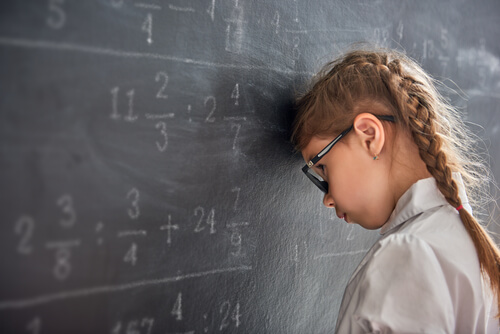Why is My Child Failing at School?

In this article, we’ll take a look at some of the causes and factors that influence failing at school, which refers to not meeting the minimum academic requirements set out by the education system. In many countries, large numbers of children fail to meet these standards.
First of all, it’s worth distinguishing between failing at school and dropping out. Students who drop out may be capable of reaching the required academic standards, but don’t complete mandatory secondary education due to their own decision.
The term “failure” in itself is controversial. It implies that individuals who don’t have formal educational qualifications have failed in their lives as a whole. It also goes along with the idea that it is the student who is to blame.
In fact, teachers, parents, the education system and the State all have a role to play when students are failing at school.

Let’s take a look at some of the most important features of academic failure:
Reasons for failing at school
- Lack of motivation or interest on the part of the student. This is more common at the secondary or high-school level than in primary or elementary students. Students who lack motivation tend to have parents who don’t fulfill their role as guides and mentors. Children and young people can easily be led astray if there is nobody to teach them the right way forward.
- Intellectual deficit. Students with cognitive limitations represent a surprisingly small percentage of those who fail to meet the minimum requirements within the education system. Studies show that around 2% of students struggle to process concepts, operations and information.
- Learning disabilities. Dyslexia and dyscalulalia (difficulty with numbers) are common issues among school-age children, and contribute to a large proportion of cases of failure at school.
- Vision problems. Strange though it may seem, shortsightedness or other eye problems can lead to a great deal of frustration at school.
- Family and socio-cultural background. The conditions we live in can influence our ability to perform at school or work. This doesn’t necessarily mean that children of parents with higher qualifications will do better at school. However, there are studies that dispute this link.
- Poor teaching. As in every line of work, there are good teachers and bad ones. A teacher’s ability to clearly transmit knowledge, treat students fairly and manage their classroom can make a big difference in the performance of their students. However, this is a secondary condition: when a student is failing at school, a bad teacher is very rarely the only cause.
Other factors that lead to failure at school
In addition to the causes above, there are also other factors that can influence a child’s performance at school.
A first factor to consider is the emotional context. This includes a child’s interpersonal relationships (with family members and peers), as well as their emotional balance and ability to control their feelings and behavior.
Another influence is the emphasis on educational success within the child’s family. Parents need to set an example and provide support to school-age children. They must empathize with their struggles and value their achievements.
Children need to be shown that school is not a waste of time. They will only value education if they can see that it’s the way to a better future.
Another lesson for parents is not to measure how much children have learned only on the basis of their grades. School is much more than tests and exams: it is where we learn to get along with others, socialize, reason and solve problems.
With this in mind, we need to see education as a whole, and not get too caught up in the statistics.

Finally, socio-economic conditions play an undeniable role in children’s performance at school. According to The Spirit Level, an influential study of inequality by the British authors Richard Wilkinson and Kate Pickett, there is a very close relationship between the level of poverty in a community and the educational attainment of its children.
“Children need to be shown that school is not a waste of time”
Educational failure in figures
Although some statistics also include students who drop out, there are some figures that give us an insight into how many children are failing at school.
Studies by official bodies in Europe show that Spain and Portugal are the worst offenders, with around 20% of students failing at school, although these figures have fallen dramatically over the last decade.
Meanwhile, in Sweden only 7% of students fail to meet standards, and in Croatia (2.8%), Slovenia (5%), Cyprus (5.3%) and Poland (5.3%) the number is even lower.
All cited sources were thoroughly reviewed by our team to ensure their quality, reliability, currency, and validity. The bibliography of this article was considered reliable and of academic or scientific accuracy.
- Pérez, V. M. O. (2009). Diversos condicionantes del fracaso escolar en la educación secundaria. Revista iberoamericana de educación, 51(1), 67-85. https://www.redalyc.org/pdf/800/80012433005.pdf
- Vidal, R. G., Calvo, T. P., & Sancho-Álvarez, C. (2011). Posibles causas del fracaso escolar y el retorno al sistema educativo. Hekademos: revista educativa digital, (9), 55-76. https://dialnet.unirioja.es/servlet/articulo?codigo=3746943
- Anaya, J. R. (2012). El fracaso escolar, causas y alternativas. En la calle: revista sobre situaciones de riesgo social, (21), 9-13. https://dialnet.unirioja.es/descarga/articulo/3832080.pdf